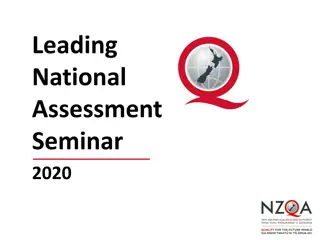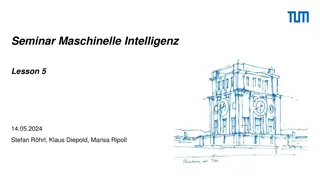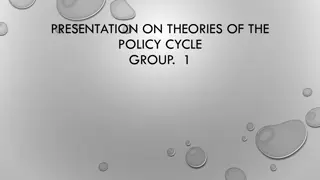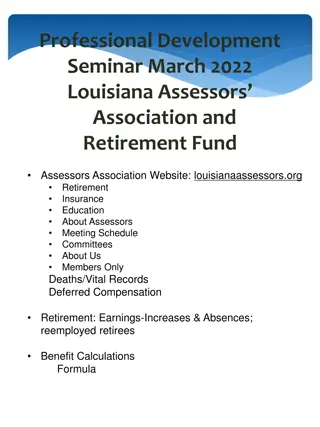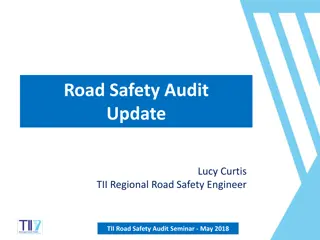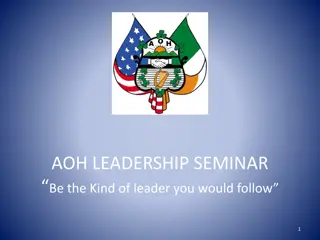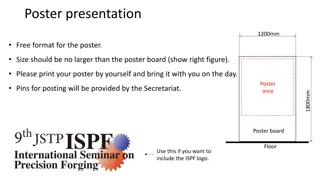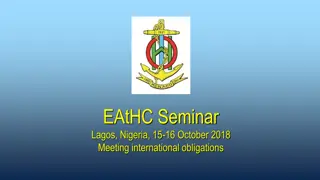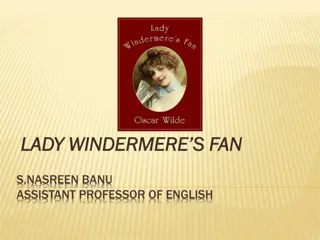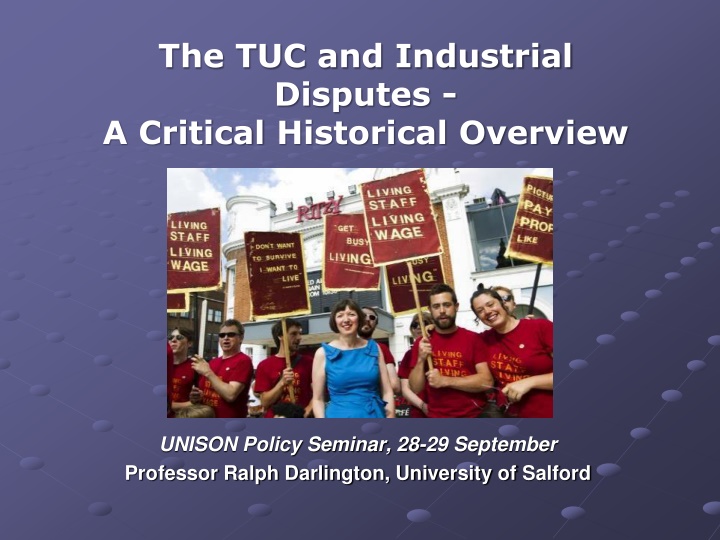
Overview of TUC and Industrial Disputes: Critical Historical Insights
Delve into the contrasting assessments of the TUC's role in significant strikes over the years, exploring criticisms and defenses. Learn about the TUC's support for strikes, involvement in negotiations, and coordination of national strike actions. This critical historical overview provides insight into the complexities of trade union movements and their impact on industrial disputes.
Download Presentation

Please find below an Image/Link to download the presentation.
The content on the website is provided AS IS for your information and personal use only. It may not be sold, licensed, or shared on other websites without obtaining consent from the author. If you encounter any issues during the download, it is possible that the publisher has removed the file from their server.
You are allowed to download the files provided on this website for personal or commercial use, subject to the condition that they are used lawfully. All files are the property of their respective owners.
The content on the website is provided AS IS for your information and personal use only. It may not be sold, licensed, or shared on other websites without obtaining consent from the author.
E N D
Presentation Transcript
The TUC and Industrial Disputes - A Critical Historical Overview UNISON Policy Seminar, 28-29 September Professor Ralph Darlington, University of Salford
Contrasting assessments On the one hand, historically the TUC General Council s role in many significant strikes (including the 1913 Dublin lock-out, 1926 General Strike and 1984-5 miners strike) has been subject to accusations of betrayals and sell-outs And in more recent years the TUC has been criticised for refusing to organise generalised strike action against government austerity measures, and its role in intervening in some disputes (such as Southern Rail in 2017)
contrasting assessments On the other hand, it has been argued it would be unfair to ignore the important constraints on the TUC General Council s ability to act in a collective directive fashion for the trade union movement, which make disingenuous claims of betrayal Moreover, despite such constraints, the TUC has clearly demonstrated its official support for many industrial disputes, as well as a willingness to galvanise solidarity by the trade union movement generally
Support for strikes Public declarations of support (eg, RMT rail; #McStrike; TGI Fridays; Picturehouse) Encouraging unions financial support (eg, 1913 Dublin lockout chartering food ships) Involvement in negotiations with employers and government on behalf of unions (eg, 2012-14 firefighters strike) Backing solidarity industrial action short of a strike (eg, 1972 miners strike) Coordinating national strike actionby the trade union movement April 1925 Red Friday embargo of coal May 1926 General Strike July 1972 strike against dockers imprisonment under the Industrial Relations Act May 1973 against Tories incomes policy May 1980 against Tories first Employment Bill Sept 1982 in support of national health workers strike March 1984 against banning of unions at GCHQ November 2011 in support of public sector pensions strike
Evidence and analysis In exploring these two contrasting perspectives over the broad historical span of the last 150 years there is much evidence that backs up the critical assessment but also need to take into account one or two underlying constraints advanced by the alternative viewpoint, along with others In sum, the TUC have often been willing to formally support industrial disputes by individual affiliates, and on occasion even coordinate much broader forms of strike action - but it has also often tended to only support action in strictly controlled and limited fashion and sometimes in ways which have understandably been perceived to have been detrimental to union members interests and aspirations Examine 4 key constraints
General Staff of Labour? Inspired by increasing radical left-wing aspirations for the TUC General Council to act as a General Staff of Labour , the 1924 Congress amended its Standing Orders so that the TUC was given increased powers to (a) intervene if a major stoppages was threatened to attempt to secure a settlement; (b) if a dispute led to a strike to mobilise moral/material support and potentially coordinate solidarity industrial action by the trade union movement However there was an underlying tension which would soon become apparent in the 1926 General Strike in the balance between the mobilisation of the resources of the trade union movement in support of the miners union and the intervention of the General Council to try to settle the dispute by negotiating a compromise settlement with the employers and government with the latter predominant
Underlying tension Felt compelled to make a gesture of support for solidarity industrial action, although it still did not have the power to call strikes in support of workers or individual unions - so General Strike had to be sanctioned by a conference of the executives of affiliated unions, - albeit they then effectively allowed the TUC to conduct the dispute and take control over negotiations with the government Calling off the strike was widely viewed as unconditional surrender and bitter betrayal - dealt a body blow to radical left-wing aspirations that the TUC should act as a General Staff of Labour It was not until the 1970s onwards that the TUC were again willing to support/coordinate national one-day strikes by the trade union movement but not itself call action And in recent years made no attempt to implement Congress decisions to consider generalised strike action against government austerity
(1) Institutional limitations So although the TUC acts as a federation of unions that can support workers disputes, the General Council s ability to act in a collective fashion for the trade union movement as a whole has always been constrained by: (a) perennial problem of reconciling the specialinterests of particular unions with the general interests of the trade union movement, and of deciding which set of interests should prevail (b) long-standing contradiction that it is not powerful enough to have directive power to lead, and affiliates are not bound by TUC policies (c) policy making/direction is a reflection of the majority view of representative unions, so the TUC General Council is only as strong as its affiliates (notably the general secretaries of big unions/ the primer movers/shakers) allow it to be
(2) Political loyalty to Labour An important contributory external constraint on the TUC s support for industrial disputes by affiliate unionshas been the way in which ideological and political loyalty to the Labour Party, especially when Labour is in office, has sometimes encouraged it to dampen down strike action so as not to undermine the government 1969In Place of Strife 1975-7 Social Contract 1977-8 firefighters strike and 1978-79 winter of discontent
(3) Problem of defying the law At the same time, the TUC has consistently resisted supporting industrial action that has risked breaching employment legislation 1972 Industrial Relations Act and Pentonville Five 1983 Stockport Messenger dispute 1984-5 Miners strike 1986-7 News International dispute
(4) Problem of challenging state power An additional external constraint on the TUC s role in industrial disputes has been the perceived need to avoid challenging the power of the government and state 1926 General Strike 1972 Pentonville dockers
Dual role As previously noted, the TUC have not always played a restraining role they have clearly also often been willing to support industrial disputes and on occasion even coordinatesolidaritystrike action The relative balance between such a dual role has varied between different historical periods and contexts depending on the relative contradictory pressures placed upon them from both above (employers, government and the state) and below (dynamics of workers struggle, level of union membership pressure and relative influence of the left on both the General Council and inside the unions) Significantly while left-wing members of the TUC General Council - backed up by the left inside the unions - have been very important in influencing matters, they have often been unsuccessful in challenging their more moderate counterparts
Moderating pressures The problem is that the TUC is not only an intermediary between capital and labour subject to powerful bureaucratic and moderating pressures, but is also one step removed in its potential responsiveness to rank-and-file union members direct forms of counter-pressure and accountability Hence while often formally supportive of strike action by affiliates, it has also tended to encourage its restriction to limited forms, and sometimes intervened to encourage settlements on the basis of compromise terms perceived as detrimental to workers interests (1984-5 miners; 2001 London Underground; 2009 Royal Mail; 2017 Southern Rail)
Potential Nonetheless, securing TUC support for strike action by individual union affiliates can often remain very important to boosting workers confidence and activity, helping to secure solidarity from other unions and broader social movement forces, creating greater opportunities for the development of union organisation and strength Moreover, on a broader level, there is a continuing need to encourage the TUC (and the unions of which they are composed) to support/co-ordinate national strike mobilisations that can also help to rebuild the trade union movement

